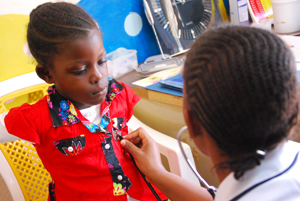 This summer, IHP is sponsoring an Emory student (read the blog) to work in collaboration with the Christian Health Association of Kenya. This project grows out of the 2012 PEPFAR consultation. While public health researchers and practitioners have long known that faith-based organizations and health systems provide a significant percentage of health services— CHAK is estimated to provide 40% of all health services in Kenya— the specifics and quality of those contributions are not well understood. This project will contribute to such knowledge by describing the role of FBOs in regard to HIV service delivery in Kenya.
This summer, IHP is sponsoring an Emory student (read the blog) to work in collaboration with the Christian Health Association of Kenya. This project grows out of the 2012 PEPFAR consultation. While public health researchers and practitioners have long known that faith-based organizations and health systems provide a significant percentage of health services— CHAK is estimated to provide 40% of all health services in Kenya— the specifics and quality of those contributions are not well understood. This project will contribute to such knowledge by describing the role of FBOs in regard to HIV service delivery in Kenya.
The project will consist of three components:
- Quantitative data analysis
- Qualitative interviews
- Assessment of structural contributions.
The quantitative component will consist of two steps. First, IHP and CHAK colleagues will analyze existing data from the Kenya Health Information System (KHIS) to ascertain the proportion of HIV services in Kenya provided by any legally registered FBO. They will also analyze the subset of all HIV services by a CHAK-related facility. These two sets of data will offer a “denominator” of overall HIV service numbers regardless of provider.
Second, we will analyze data from PEPFAR on FBOs that serve as implementing partners in Kenya’s PEPFAR Country Office. Both of these data sets will be analyzed using 16 separate indicators that have been developed that connect data reporting and clinical services to program outcomes in the areas of prevention, treatment, and service.
This two-step process will offer much-needed knowledge about the specifics of faith-based service delivery. However, the numbers alone do not tell the whole story. Many of the particular contributions of FBOs are more qualitative and less tangible. These factors include trust, provider and consumer motivations, and history in a community.
To understand these factors more fully, we will develop an interview instrument and complete interviews with a select sample of consumers seeking services at CHAK facilities. The interview will ask participants about their perceptions of CHAK and faith-based facilities in regard to trust. The questions will focus on whether trust is a significant factor in service provision and health outcomes and the questions will ask about the role of trust in regard to critical HIV program issues of HIV prevention and testing services, referral into treatment for those who test positive, and retention in care for HIV-positive consumers.
